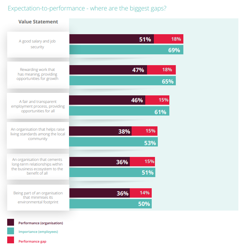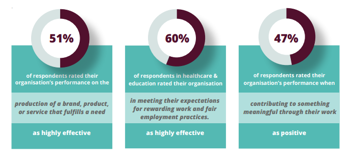
So we know that people place importance on a range of factors well beyond their own financial wellbeing. But how successfully are Australian organisations responding to these demands? Our research shows they are falling short of their people’s expectations across all factors.
A disconnect between employees and management
Recent studies have shown how important the employee experience is to business success - and it’s not just about the paycheck<link to money blog>. The importance of psychological and social elements can’t be overlooked.
There is currently a disconnect in how senior decision makers perceive the performance of their organisations, compared to general employees. When we consider some of the most important factors such as ‘a good salary and job security’, 47% of general employees agreed their organisation performed well. In contrast, 57% of decision makers agree. Similarly, when analysing the results for ‘rewarding work that has meaning, providing opportunities for growth’, just 41% of general employees agreed performance was strong, compared to 55% of business decision-makers.
Perhaps some of the explanation for this disparity is the fact that people say they have very little impact in helping their organisations to drive initiatives that lead to specific outcomes. Most employees feel unable to affect the direction and focus of their organisation. Across a range of measures, just 36% said their organisation’s ‘financial success and growth’ was driven by all people within the business. That drops to 28% when it comes to driving their organisation’s ‘positive impact on the environment’, 36% for ‘positive impact on their people’ and 37% for ‘positive impact on the wider community’.
Having employees who feel disempowered to make a difference is a recipe for disengagement and should be considered a warning to organisations seeking to drive better engagement.

Our research highlights that employers need to refocus on what motivates their people. A lack of clarity around what an organisation stands for and how they support their employee’s values is a key issue contributing to the gap in performance. Mainly attributed to a lack of direction between management, less than two thirds (32%) of workers are very willing to go above and beyond for their organisation.
To address this problem, organisations need a more holistic understanding of what their employees value most and must ensure they have the right systems to support them. One of the ways this can be achieved is through the adoption of an autonomous approach to work and people management.
Closing the performance gap in employee experience
Employees want to be rewarded for their hard work - it helps them feel valued, leading to being more engaged at work. Additionally, insecure employment can cause stress and anxiety, ultimately affecting retention. A lack of fair pay can also impact an employee’s self-esteem, sense of belonging and optimism about future prospects.
Respondents reported that organisations are not meeting expectations in this regard. Nearly half (49%) said their organisations are underperforming in terms of salary and job security. It’s easy to focus on the numbers: sales, revenues, profits. But what’s not so easy is managing employees in a way that makes them feel as though they are also helping to create value in their communities.
Diversity and community benefit are a recurring theme in workers’ ranking of importance, but represents one of the biggest gaps when it comes to how organisations are performing. To calculate what we term the ‘expectation-to-performance’ gap, we identified the difference in the scores between how important an employee rates a statement, versus how well they believe their organisation is performing against that statement. With an expectation-to-performance gap of 10%, workers want more ‘diversity in thought and people’ while desiring ‘an organisation that invests in education, training and skills to benefit the community.’

The data indicates people perceive organisations performing poorly overall on environmental and social factors. A large proportion of people were not convinced at their ‘organisation’s ability to minimise their environmental footprint’ (expectation-to-performance gap of 14%). While more people felt their organisation was not effective at ‘raising living standards in the community’ (15% gap). And when it comes to differences between industries, it’s notable the research indicates the government sector consistently fails to meet expectations, with an expectation-to-performance gap average of 14%.
Where organisations manage to shine
The factors where organisations perform best are in terms of product and/or service fit. Fifty-one percent of respondents rated their organisation’s performance on the ‘production of a brand, product, or service that fulfils a need’ as highly effective. This factor was where fewest respondents (26%) felt organisations were underperforming. Organisations also tend to do better when it comes to ‘offering rewarding work and opportunities for professional development’ and using fair employment practices.
Australian workers want to feel like they are contributing to something meaningful through their work. Nearly half (47%) rated their organisation’s performance on this factor positively, and it was also one of the few factors on which less than a third of respondents (28%) felt organisations were underperforming.

Organisations’ employment practices are generally an area of strength: almost one-and-a-half times the number of respondents rated their organisation as highly effective on this measure versus those that are underperforming. Some industries outperform the average on these factors. Sixty percent of respondents in healthcare and education said their organisation is effective in meeting their expectations for rewarding work and fair employment practices.
Growth has become hardwired into our consciousness as a metaphor for prosperity and success. Partly, this is a result of the way we use growth metrics to gauge performance because they are easier to measure and comprehend. Revenue, profit margin and customer acquisition are all tangible, easily comparable numbers people understand. However, customers, employees and investors are urging organisations to go beyond financial measurements of success.
Our research shows a more nuanced picture. One where psychological and social factors are just as important, if not more so in some cases as economic ones; and where people want to work for organisations that have a wider social impact.
Download the full Powering Profits and Prosperity report, or explore more on the Access Research Hub.